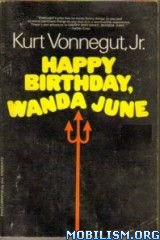8 books by Kurt Vonnegut
Requirements: EPUB Reader, 4 MB / 340, 105 & 96 Kb
Overview: Kurt Vonnegut, Junior was an American novelist, satirist, and most recently, graphic artist. He was recognized as New York State Author for 2001-2003. He was born in Indianapolis, later the setting for many of his novels. He attended Cornell University from 1941 to 1943, where he wrote a column for the student newspaper, the Cornell Daily Sun. Vonnegut trained as a chemist and worked as a journalist before joining the U.S. Army and serving in World War II.
After the war, he attended University of Chicago as a graduate student in anthropology and also worked as a police reporter at the City News Bureau of Chicago. He left Chicago to work in Schenectady, New York in public relations for General Electric. He attributed his unadorned writing style to his reporting work. His experiences as an advance scout in the Battle of the Bulge, and in particular his witnessing of the bombing of Dresden, Germany whilst a prisoner of war, would inform much of his work. This event would also form the core of his most famous work, Slaughterhouse-Five, the book which would make him a millionaire. This acerbic 200-page book is what most people mean when they describe a work as "Vonnegutian" in scope. Vonnegut was a self-proclaimed humanist and socialist (influenced by the style of Indiana’s own Eugene V. Debs) and a lifelong supporter of the American Civil Liberties Union. The novelist is known for works blending satire, black comedy and science fiction.
Genre: Fiction /Classics
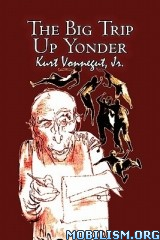
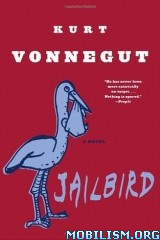
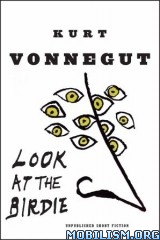
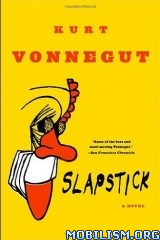
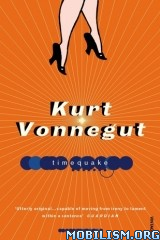
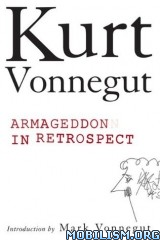
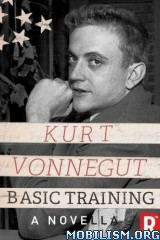
The Big Trip Up Yonder: Gramps Ford, his chin resting on his hands, his hands on the crook of his cane, was staring irascibly at the five-foot television screen that dominated the room. On the screen, a news commentator was summarizing the day’s happenings. Every thirty seconds or so, Gramps would jab the floor with his cane-tip and shout, "Hell, we did that a hundred years ago ". Emerald and Lou, coming in from the balcony, where they had been seeking that 2185 A.D. rarity–privacy–were obliged to take seats in the back row, behind about a dozen relatives with whom they shared the house. All save Gramps, who was somewhat withered and bent, seemed, by pre-anti-gerasone standards, to be about the same age–somewhere in their late twenties or early thirties. Gramps looked older because he had already reached 70 when anti-gerasone was invented. He had not aged in the 102 years since.
Jailbird: Jailbird takes us into a fractured and comic, pure Vonnegut world of high crimes and misdemeanors in government and in the heart. This wry tale follows bumbling bureaucrat Walter F. Starbuck from Harvard to the Nixon White House to the penitentiary as Watergate’s least known co-conspirator. But the humor turns dark when Vonnegut shines his spotlight on the cold hearts and calculated greed of the mighty, giving a razor-sharp edge to an unforgettable portrait of power and politics in our times.
Look at the Birdie: Look at the Birdie is a collection of fourteen previously unpublished short stories. In this series of perfectly rendered vignettes, written just as he was starting to find his comic voice, Kurt Vonnegut paints a warm, wise, and funny portrait of life in post—World War II America–a world where squabbling couples, high school geniuses, misfit office workers, and small-town lotharios struggle to adapt to changing technology, moral ambiguity, and unprecedented affluence. Here are tales both cautionary and hopeful, each brimming with Vonnegut’s trademark humor and profound humanism. A family learns the downside of confiding their deepest secrets into a magical invention. A man finds himself in a Kafkaesque world of trouble after he runs afoul of the shady underworld boss who calls the shots in an upstate New York town. A quack psychiatrist turned "murder counselor" concocts a novel new outlet for his paranoid patients. While these stories reflect the anxieties of the postwar era that Vonnegut was so adept at capturing– and provide insight into the development of his early style–collectively, they have a timeless quality that makes them just as relevant today as when they were written. It’s impossible to imagine any of these pieces flowing from the pen of another writer; each in its own way is unmistakably, quintessentially Vonnegut. Read "Hello, Red" and "The Petrified Ants," two of the stories from the collection, as single-story e-books before Look at the Birdie goes on sale.
Slapstick: Slapstick presents an apocalyptic vision as seen through the eyes of the current King of Manhattan (and last President of the United States), a wickedly irreverent look at the all-too-possible results of today’s follies. But even the end of life-as-we-know-it is transformed by Kurt Vonnegut’s pen into hilarious farce—a final slapstick that may be the Almighty’s joke on us all.
Timequake: According to science-fiction writer Kilgore Trout, a global timequake will occur in New York City on 13th February 2001. It is the moment when the universe suffers a crisis of conscience. Should it expand or make a great big bang? It decides to wind the clock back a decade to 1991, making everyone in the world endure ten years of deja-vu and a total loss of free will – not to mention the torture of reliving every nanosecond of one of the tawdiest and most hollow decades. With his trademark wicked wit, Vonnegut addresses memory, suicide, the Great Depression, the loss of American eloquence, and the obsolescent thrill of reading books.
Armaggedon in Retrospect: To be published on the first anniversary of Kurt Vonnegut’s death, Armageddon in Retrospect is a collection of twelve new and unpublished writings on war and peace, imbued with Vonnegut’s trademark rueful humor.
Basic Training is a bitter, profoundly disenchanted story which satirizes the military, authoritarianism, gender relationships, parenthood and most of the assumed mid-century myths of the family. Haley Brandon, the adolescent protagonist, comes to the farm of his relative, the old crazy who insists upon being called The General, to learn to be a straight-shooting American. Haley’s only means of survival will lead him to unflagging defiance of the General’s deranged (but oh so American, oh so military) values. In this novella, published here for the first time, exist not only Vonnegut’s influences and what later became his voice but Vonnegut’s grand themes: trust no one, trust nothing; the only constants are absurdity and resignation, which themselves cannot protect us from the void but might divert.
Happy Birthday, Wanda June: In his first published play, Kurt Vonnegut finds a powerful vehicle for his tragicomical imagination. When the great hunter Harold Ryan–missing and presumed dead–returns from Africa after eight years, his wife is aghast and his son is enchanted. Vonnegut’s attack on phony heroes and male swagger uses some of the funniest dialogue ever created for the stage.
Download Instructions:
Books 1 to 5: http://gestyy.com/wLd0Uz
Book 6: http://gestyy.com/wLd0Uv
Book 7: http://gestyy.com/wLd0Um
Book 8: http://gestyy.com/wLd0UE
Mirror:
Books 1 to 5: http://gestyy.com/wLd0UO
Book 6: http://gestyy.com/wLd0US
Book 7: http://gestyy.com/wLd0UG
Book 8: http://gestyy.com/wLd0UK
